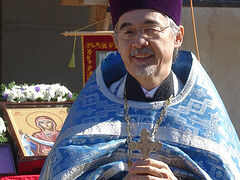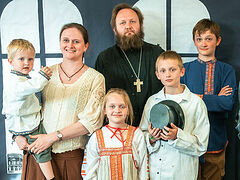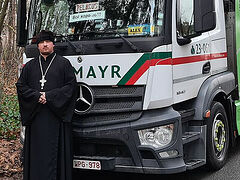I had the good fortune to talk with the grandson of a White Guard officer and the son of a Russian princess. Priest George Mashtaler is the rector of the Church of Sts. Peter and Paul in Luxembourg of the Western European Diocese of the Russian Orthodox Church Outside of Russia (ROCOR), a Ph.D in chemistry and a patent specialist. We talked about the White Army and ancestral traditions, the difficult life of the diaspora after the “Russian Exodus”, the comfort of Luxembourg, preacher-wives, teenage problems, attitudes to the USSR, friendship with Catholics, the problems of parishes in the West, and the need for self-improvement.
 Priest George Mashtaler with parishioners
Priest George Mashtaler with parishioners
—Fr. George, if I’m not mistaken, you are a third-generation descendant of White emigrants. Tell us about your spiritual journey and your family.
—That is right. I was born in 1959 in Argentina. I am the grandson of Boris Mashtaler, second lieutenant of the White Volunteer Army. He served with General Kornilov. Boris Nikolaevich was born in 1902 in Kiev. He graduated from high school in 1919 with honors and immediately joined the Volunteer Army to fight against the Bolsheviks.
 Boris Nikolaevich Mashtaler (1923) —This is significant: An excellent student figured out what was happening and made the right choice.
Boris Nikolaevich Mashtaler (1923) —This is significant: An excellent student figured out what was happening and made the right choice.
—Yes. And, as you understand, he joined the White Army, seeing what was happening in his homeland, especially after the Treaty of Brest-Litovsk when the Germans occupied Kiev. And he really wished a different fate for Russia. In 1920, he was evacuated with the remnants of General Wrangel’s army to Gallipoli, and a year later he ended up in Bulgaria with his regiment. There he graduated from the St. Sergius Artillery School with the rank of second lieutenant and moved to France in 1923 where he worked as a taxi driver. There he met his future wife. They had a son, my father Vladimir, and a daughter, my aunt Xenia. And in 1947 they moved to Argentina.
I was born in Buenos Aires to the family of Vladimir Mashtaler and Princess Elena Gagarina. The Gagarin family had the tradition of naming all male children born every other generation either Gregory or George and sending them to study either mineralogy or fine arts. Among the most famous representatives of this family are three generations of researchers who formed a rare collection of minerals (3000 items).
—An impressive collection.
—Gregory Gagarin was Vice-President of the Imperial Academy of Arts in St. Petersburg, and it was he who covered the walls and vaults of the Transfiguration Church in Baden-Baden with frescoes. So, when my grandfather was a taxi driver between 1923 and 1947, he met my grandmother, Tatyana Vladimirovna Rogova, from a Russian family living in Riga. My great-grandfather on my grandmother’s side was a railway engineer during the Russian Civil War. His family, fortunately, didn’t suffer, although they were subjected to severe harassment. In the late 1920s my grandmother moved to Paris, met my grandfather, and they got married in the church of Gallipoli. My aunt, Xenia Borisovna Mashtaler (now Pervyshina), was born, and in July 1937 my father was born in Paris.
My father moved with his family to Argentina, graduated from the university and met my mother. After the “Russian Exodus” my maternal grandfather, Prince Grigory Georgievich Gagarin, ended up with his family in Serbia, which accepted many emigrants. Serbia allowed scientists, engineers, physicists and all specialists to work in their fields; Unlike France, where people came from Russia after graduating from universities and couldn’t work in their fields because their diplomas weren’t recognized in the West. For instance, there were cases when princes and professors became taxi drivers.
 Boris Nikolaevich Mashtaler in Bulgaria
Boris Nikolaevich Mashtaler in Bulgaria
—Did Serbia recognize Russian diplomas?
—Yes, it did. And to Serbia’s credit, it allowed Russians to study, work and remain who they were. A professor remained a professor, an engineer remained an engineer, a writer, a writer, and a priest, a priest. My mother was born in Serbia. She was the mineralogist Prince Gregory Georgievich Gagarin’s daughter. When Tito came to power, they were forced to go to Dresden. And after Dresden my grandparents and children (my mother and her sister Marianne) moved to Argentina. There my father met my mother. I was born in 1959, my brother in 1960, and my sister in 1966. My brother, Priest Alexander Mashtaler, now serves in the Russian Church under the jurisdiction of the Moscow Patriarchate near Paris. After his birth we returned to France, where we lived between 1961 and 1965, then again in Argentina for two years, and in 1967 we settled in France. We lived with my grandparents in the south, then in Meudon near Paris, where St. John of Shanghai and the poet Marina Tsvetaeva used to live.
—My head is spinning from the scope of these moves and the cycle of events!
—My brother and I first studied at an Argentinian school, and only then in France. The family mainly used the Russian language…
We were brought up in the faith. My grandparents believed in God. My grandmother came from a family of Old Believers.
—That’s a surprise.
—She belonged to the “Popovtsi” (those who recognize the priesthood) denomination. As you know, there are quite a few Old Believers near Riga. So we were raised in the faith. Wherever White emigrants fled from the Bolsheviks, the first thing they did was to build a church. At first, services were celebrated in barracks and garages. Conditions were hard and modest. I must say that our membership in the “Vityazi” (“Knights”) youth organization in Paris, which still exists today, helped me and my brother very much. There we learned Russian history, poetry and the Law of God. So, it’s not surprising that we were brought up in the Orthodox faith from childhood.
My grandfather was involved in the construction of the church in Buenos Aires. This environment greatly facilitated our Orthodox upbringing. The ever-memorable Archbishop Anthony (Bartoshevich), Archpriest Alexander Trubnikov, Archpriest Michel de Castelbajac (ordained priest by St. John of Shanghai), and Fr. Michael Artemovich were living examples for us. My brother and I went to church, read and sang under the guidance of the choir director, Konstantin Kirillovich Malinin. We gradually integrated into church life. As you can imagine, the third generation of Russian emigrants were having a hard time, since there was strong assimilation. There were many mixed marriages. Churchliness was being lost. When I was twenty, though my grandfather was still alive, the Russia of my grandfather was no more. For us the Soviet Union was not Russian culture, but a political system hostile to us. That was the view of many people in the diaspora. And we were nurtured by our priests in the faith, attended services, and studied. I studied at the university until I defended my doctoral thesis. We tried to preserve what we loved and appreciated in Russian culture.
 The Church of the Holy Apostles Peter and Paul
The Church of the Holy Apostles Peter and Paul
—Was it these pious examples—first of your family, then of the clergy—that prompted you to decide to become a priest?
—I didn’t decide to become a priest...
—How so?
—Because I was a deacon, served in Geneva, found a job in 2008 in Luxembourg at the patent office, and was then able to help the reposed Archpriest Serge Pouh, who built the church. He served till the age of eighty-five, and by the decision of Archbishop Michael (Donskov), then ruling hierarch of the Diocese of Geneva and Western Europe (ROCOR), I was offered the priesthood. It was difficult to refuse in that situation... It will soon be ten years since I began to serve in the Church of the Holy Apostles Peter and Paul.
—You’ve anticipated my question on how Luxembourg became your new home. So first it was a vacant position, and only then a place of ministry.
—Yes, I found a job here. Even before 2008 I had worked with patents, being a chemist by profession. I served in Geneva, and then everything worked out somehow—and here I am in Luxembourg.
—What were your first impressions of the country? Was there a culture shock? What was especially striking in terms of the mentality of local social rules and attitudes and life in Luxembourg in general?
—Luxembourg is a tiny country, with a population of 600,000! Many come from Germany, Belgium and France because the standard of living is quite high. Its mentality makes it an appealing country. It’s very peaceful here. In terms of social welfare, it’s a great place for family life, children and schools. Luxembourg has a lot of forests and places to go for walks. The infrastructure is wonderful. Life is easy, everything is a stone’s throw away. The Luxembourgers are quiet and agreeable people and it is a pleasure to chat with them.
—There are probably very few Orthodox in such a small country. What jurisdictions are represented in Luxembourg? Are there many of our compatriots there today?
—By 1928 there was already an Orthodox community here. So we will be celebrating its centenary soon. There is one Russian parish, there are communities of Romanians, Serbs and Greeks. There are about 5,000 Russian speakers in Luxembourg, including those from Ukraine and Belarus. The largest Orthodox community belongs to the Romanians.
To be continued…




